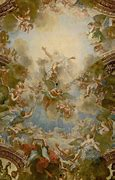A Knight Of Ghosts And Shadows, XVI.
Through Poul Anderson's empathetic writing, we imaginatively enter into Kossara Vymezal's prayer. She remembers her dead: her family, her fiance, her zmay servant, every soul and every living being that was killed when her home was nuked:
"Father of Creation, receive them. Jesus, absolve them. Mary, comfort them. Light of the Holy Spirit, shine upon them forever.
"I dare not ask for more. Amen." (p. 542)
Some Christians would confidently ask for everything and would not address Mary. Either way, this theology is perhaps the most complicated there is. Kossara, who herself will soon be a saint and prayed to, addresses four persons. I have to write "persons" rather than "beings" or "deities" because:
the three divine persons are one being;
Mary is a human being;
Jesus is both a divine and a human being.
That reads like a Hegelian triad of thesis, antithesis and synthesis.
Is it customary to address Mary between members of the Trinity?
Kossara believes that these four persons literally exist. They are not myths or personifications. She also believes that all the departed souls are immortal and will (hopefully) be received by the Father. Secularists simply dismiss all such beliefs. Maybe some of us can appreciate religions as what Alan Moore called "higher fictions." In The King Of Ys by Poul and Karen Anderson, Ysans, unlike Christians, do not understand their myths literally.
In SM Stirling's The Peshawar Lancers, the British Empire, Angrezi Raj, relocates to India where Anglican and Hindu concepts merge. Our hero appropriately reflects on Krishna. As a myth, I appreciate Vishnu:
the middle member of the Trimurti (Triple Form) - Brahma/Creator, Vishnu/Preserver, Shiva/Destroyer;
incarnated in an evolutionary sequence of animals and human beings, the latter including Krishna, the Buddha and (I don't see why not) Christ.

No comments:
Post a Comment